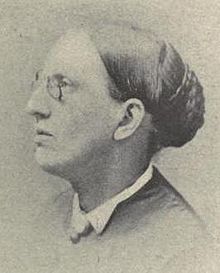Caroline Healey Dall
| Caroline Healey Dall | |
|---|---|

Portrait of Caroline Wells Healey Dall, ca.1872
|
|
| Born |
Caroline Healey June 22, 1822 Boston, Massachusetts, USA |
| Died | December 17, 1912, aged 90 Washington D.C., USA |
| Nationality | American |
| Other names | Caroline Healey Dall |
| Occupation | Writer and Reformer |
| Known for | Participation in the Women's Rights Movement and Transcendentalism |
Caroline Wells Healey Dall (June 22, 1822 – December 17, 1912) was an American feminist writer, transcendentalist, and reformer. She was affiliated with the National Women's Rights Convention, the New England Women's Club, and the American Social Science Association. Her associates included Elizabeth Peabody and Margaret Fuller, as well as members of the Transcendentalist movement in Boston.
Caroline Healey was born and raised in Boston, Massachusetts, daughter of Mark Healey, a merchant and investor, and Caroline Foster. She lived there off and on during her life. As a young woman, she received a comprehensive education, encouraged by her father to write novels and essays, and to engage in debates about religion, philosophy and politics. In addition to private tutoring, she attended a private school for girls run by educator Joseph Hale Abbot, until the age of fifteen. She married Charles Dall, a Unitarian minister who worked with the poor in Baltimore, in 1844. The two lived in Toronto during the early 1850s, and returned to Boston in 1855. Her children included William Healey Dall, in whose Washington DC home she lived her later years.
Though she continued to write through the early years of her marriage and child-rearing, after her husband moved to Calcutta, India to perform missionary work, Dall became an active participant in the Boston Women's Rights movement. She was soon an active lecturer and writer on the topic, and organized the New England Women's Rights Convention, along with suffragist Paulina Davis. Also with Davis she founded Una, a journal devoted to woman's rights, and the pioneer publication of its kind. After deciding that she did not like working with groups, Dall turned to writing as her principal means of addressing women's equality. her most prominent works from this time included Historical Pictures Retouched: a Volume of Miscellanies (1861), which highlighted previously ignored women in history, and a collection of lectures entitled The College, the Market, and the Court; or Woman's Relation to Education, Labor, and Law (1867) in which she argued that the modern woman was no longer content to be in the domestic sphere and should be allowed to participate in public life. The New York Evening Post called this collection "the most eloquent and forcible statement of the Woman's Question which has been made." Dall was a founder of the Social Science Association (1865).
...
Wikipedia
